
University of Pennsylvania’s Solidarity Visit to Tel Aviv University
Understanding Trauma and Building Collaborations.
Against the backdrop of escalating concerns regarding antisemitism on American university campuses, a significant delegation from the University of Pennsylvania (UPenn) embarked on a solidarity visit to Tel Aviv University on January 4. The purpose of their visit was twofold: to express unwavering support for their Israeli counterparts and to gain profound insights into the aftermath of the harrowing events that transpired on October 7. The collaborative effort resulted in a joint symposium titled “October 7th: Coping with Trauma,” a comprehensive exploration of social, political, and psychological perspectives.
Prof. Michael Kahana, from the University of Pennsylvania, who initiated the open letter in support of Israel and the current visit said: ‘In the weeks after October 7, we felt very distant in physical space, but very close in emotional space. I’m gratified that so many colleagues, many of whom I haven’t even met before joined me on this visit.”
“Together we’ll come out of this stronger.”— Michael Kahana, Edmund J. and Louise W. Kahn Term Professor of Psychology at the University of Pennsylvania
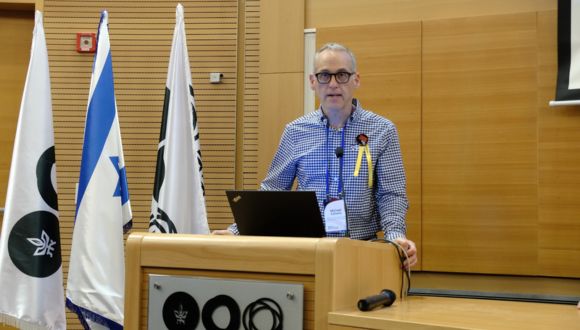
Michael Kahana, Edmund J. and Louise W. Kahn Term Professor of Psychology at the University of Pennsylvania
TAU President Ariel Porat thanked the UPenn delegation for their visit: “It’s important for us to have people like you come to us during these most difficult times ever because these days we need friends.
“Choosing to come shows support and empathy for people in Israel and Israeli universities.” TAU President Ariel Porat
TAU Rises to the Challenge
Addressing the challenges the university faced since the war’s inception, Ariel Porat explained that, immediately after October 7, up to one-third of undergraduates were called up for reserve duty. As a result, the academic year was postponed by more than two months and only started on December 31 to avoid losing the full academic year. Special provisions were instituted to aid reserve soldiers in completing their academic commitments while still being on active duty.
Beyond logistical challenges, potential tension between Jewish and Arab communities on campus posed an additional hurdle. TAU, committed to fostering a safe environment for all, undertook substantial efforts to ensure a smooth start to the academic year without incidents.
“We are sensitive to free speech, even when it collides with other values. Even in times of war, democracy, human rights and civil rights are not suspended,” commented President Porat.
Notably, TAU, unlike some other Israeli universities, refrained from expelling students expressing views related to the October 7th massacre without following proper legal procedures.
Navigating Trauma through Cinema
Renowned Israeli filmmaker Avi Nesher, drawing from his extensive experience, presented a unique perspective on trauma through the lens of cinema. Reflecting on two of his films, The Matchmaker and The Image of Victory, Nesher underscored cinema’s role in shaping a nation’s mythology and the imperative of acknowledging conflicting narratives.
The Matchmaker delves into the profound bond uniting the Israeli people, formed as a reaction to the Holocaust. Nesher highlighted the collective post-trauma stemming from the Holocaust, an ever-present yet unspoken force in the national psyche. The events of October 7, by reactivating this deep-seated trauma, resonated profoundly with the nation.
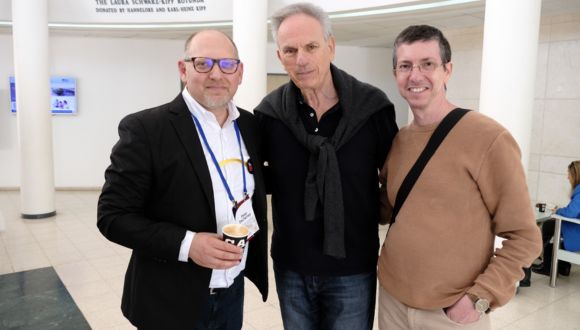
Professor Peter Decherney (UPenn), film director Avi Nesher, film scholar Dr Shmulik Duvdevani
“We don’t want to think about ourselves as lamb to slaughter. Locked into a collective, locked into post-holocaust trauma, we’ll all emerge only as a collective.” — Avi Nesher, filmmaker
In The Image of Victory, which recounts the 1948 Egyptian raid on a kibbutz, Nesher weaves together opposing narratives. He argued that cinema’s power lies in compelling audiences to confront and ultimately acknowledge uncomfortable truths.
“If there are two conflicting narratives, the conflict can go on forever. Sympathy is possible when you honor the narrative you don’t agree with and learn to co-exist.”
Nesher added that the complete negation of the Israeli narrative witnessed on many university campuses felt like a major betrayal as universities are the first places where conflicting narratives should be embraced.
A Dive into the Background to the War
Prof Itamar Rabinovitch, former TAU President, ambassador to the US (1993-1996), and Visiting Professor at UPenn, Harvard, and Stanford, provided a succinct political analysis of the ongoing conflict. Describing the events of October 7 as the most severe crisis since the establishment of the state, he attributed the crisis to failures in politics, policy, intelligence, and military execution.
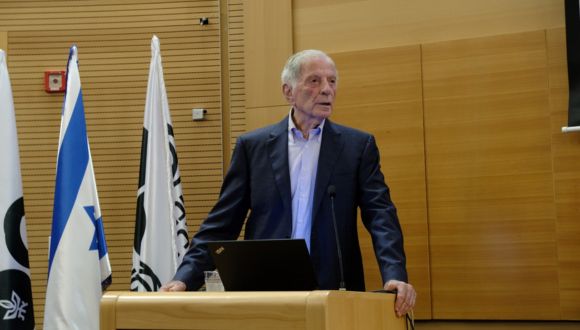
Prof Itamar Ravinovitch, former TAU President, ambassador to the US (1993-1996), and Visiting Professor at UPenn, Harvard, and Stanford
The internal divide in the country, exacerbated by attempts to weaken democracy, created an opportunity for adversaries. The policy to cultivate Hamas at the expense of the Palestinian Authority backfired, leading to a significant transfer of Qatari money into the hands of Hamas. Intelligence failures compounded the situation, resulting in a delayed response from the Israeli Defense Forces (IDF).
Prof Rabinovitch stressed that the current conflict is not merely a war with Gaza but represents the first war between Israel and Iran, with an uncertain resolution and future plans for Gaza.
However, the strength and resilience of the Israeli civil society inspire optimism about the future.
Understanding Trauma: Psychological and Social Dimensions
The symposium’s third panel, Perspectives on Trauma, provided a comprehensive examination of psychological and social dimensions. Prof Talma Hendler, the session moderator, highlighted the collective impact of the October 7 events on every individual in Israel, creating a shared sense of group trauma.
Prof. Bruria Adiri presented findings from a longitudinal study initiated post-attack, assessing distress and resilience across various social groups. Initial measurements in mid-October revealed unprecedented distress levels, gradually subsiding by November. Societal resilience exhibited a peak on October 23, marked by diverse groups coming together in solidarity. However, over time, societal resilience experienced a decline, while individual resilience continued to grow.
Factors influencing individual resilience included hope, community resilience, government support, and religiosity.
Higher vulnerability was noted among 30 to 40-year-olds, potentially attributed to heightened stressors related to finances, careers, family responsibilities, and uncertainty about the future.
Addressing Mental Health Challenges Post-Attack
Prof Gil Zaisman delved into mental health issues, outlining contributing factors to post-traumatic stress in the Israeli population. The October 7 attack, marked by extreme cruelty and sexual violence, triggered PTSD even in those not directly involved, exacerbated by the online dissemination of terrorist-recorded footage.
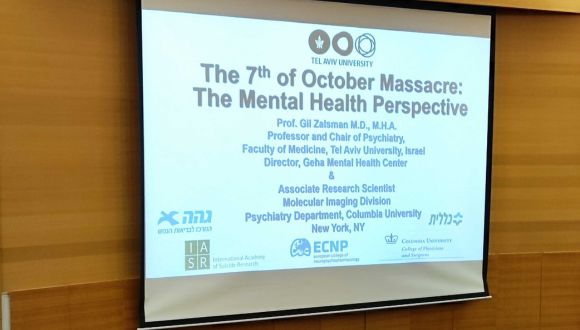
To counteract these effects, Israeli mental health professionals initiated various initiatives. Immediate victims were treated, and initiatives like the Regional Trauma Center, Daycare Unit for Sexual Victims, and Center for Children and Adolescents were established.
Additionally, Prof Yair Bar-Haim detailed the creation of the National Center for PTSD at TAU, initially planned for late 2025. The unprecedented scale of the October 7 attack necessitated an accelerated timeline, with the center treating its first patients on January 1.
In addition to providing treatment for individuals affected by PTSD, researchers at TAU are actively working on preventative measures for soldiers. They employ software designed to train soldiers in directing their attention to potential threats, a method proven to substantially decrease the risk of developing PTSD. Following the events of October 7, a team led by Prof. Bar-Haim developed a dedicated app, which was subsequently distributed to the mobile phones of all soldiers in active combat units.
Gender Dynamics in the Aftermath of October 7
Prof Daphna Hacker, an expert on women studies and member of the UN Committee on the Elimination of Discrimination Against Women, explored the gender aspect of the war.
With Israel being the first and only country with mandatory military service for both men and women, 36% of TAU students called up for reserve duty are women, many of whom are engaged in active combat.
Notably, an all-female tank unit successfully repelled a Hamas attack on a kibbutz on October 7, fighting for an astounding 17 hours
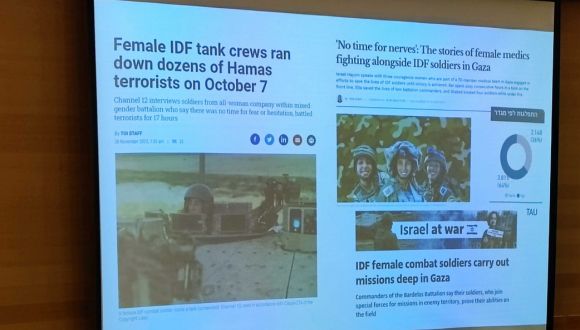
At the same time, many Israeli women and girls became victims of sexual violence on October 7. The shock over mass casualties initially prioritized victim identification and burial over forensic evidence collection, complicating international acknowledgment of the violence. To compound the issue, irresponsible domestic discourse about the scope of sexual violence has caused significant moral panic in Israel.
Another serious gender issue is the struggle to secure the release of hostages held by Hamas. The Red Cross has not been allowed to visit hostages, making it impossible to establish their health condition and to properly prioritize those who need to be released first.
All hostages, irrespective of their gender, should be brought home.
The final aspect Prof Hacker highlighted is the absence of women at the decision-making level, with all the crucial decisions on the war, ceasefire, hostage release and so on made by men.
In Gaza, where at least 50% of women report domestic violence, the devastating humanitarian crisis is the outcome of men’s actions and women are overrepresented only on the victim side.
Women are active in the struggle for peace – two Tel Aviv University professors established The Day after the War multidisciplinary academic action forum that calls on the Israeli government to declare that it has no intention of occupying Gaza and to join an international coalition that would force Hamas to surrender.
All those who live on this tiny piece of land on both sides of the disputed borders are traumatized by nationalism, militarism, religious fanaticism, and sexism.
Coping with Trauma: Captivity and Its Aftermath
Dr. Yael Lahav explored captivity trauma, emphasizing exposure to multiple stressors, including torture, sexual abuse, deprivation, and isolation. Homecoming for former hostages becomes a challenging transition, with difficulties in feeling safe and resuming normalcy amid destroyed homes and lost loved ones. The harsh realities faced by returning hostages contribute to long-term health issues, premature aging, and early mortality.
Moreover, secondary traumatization affects the family and friends of hostages, manifesting as PTSD symptoms. Dr. Lahav underscored the need for comprehensive mental health support and societal understanding to facilitate the reintegration of former hostages into daily life.
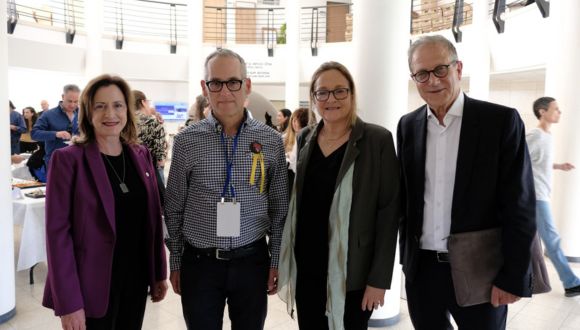
Prof Karen Avraham, Dean of the TAU Faculty of Medicine; Prof Michael Kahana, Edmund J. and Louise W. Kahn Term Professor of Psychology at the University of Pennsylvania; Prof Milette Shamir, TAU VP International; Prof Itzhak Fried, Professor-in-Residence, Neurosurgery, University of California Los Angeles
Academic Collaborations and Concerns
Milette Shamir, in concluding discussions, expressed concern over the rising wave of academic boycotts, particularly in social sciences, law, and humanities. While acknowledging supportive gestures, such as the EU postponing grant application deadlines for Israeli researchers, she stressed the importance of countering academic boycotts.
Members of the UPenn delegation expressed heartfelt support for their Israeli counterparts. They proposed ideas to expand research collaborations and study abroad opportunities for both American and Israeli students. Suggestions included summer programs, research internships, undergraduate scholarships, and joint projects, reflecting a commitment to strengthening academic ties amidst challenging times.
In essence, the UPenn solidarity visit to TAU served not only as a gesture of support but also as a platform for interdisciplinary discussions on trauma, resilience, and the collaborative pursuit of knowledge.
As both institutions navigate the complex aftermath of October 7, the shared commitment to academic collaboration stands as a testament to the enduring power of education and understanding in times of adversity.
Related posts







One in Three Arab Israelis Prefer External Governance for Gaza Post-War


